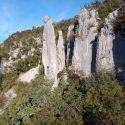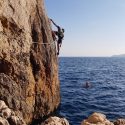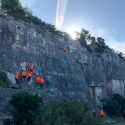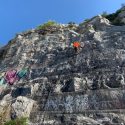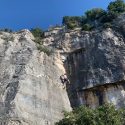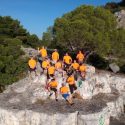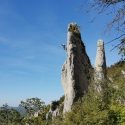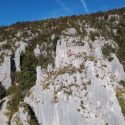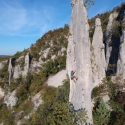On the 19th October 2019 the Third Battalion, the Princess of Wales’s Royal Regiment, alongside members of the First Battalion the Anglian Regiment mounted a unified Queen’s Division Rock Climbing Expedition in Croatia. The aim of this expedition was to build bonds between the division and also deliver a Rock Climbing Single Pitch Award as Distributed Training alongside the aims of Adventurous Training (AT).
We flew from Gatwick and arrived at Pula airport (Western Croatia) in the evening. Having traveled to our villa we got some rest ahead of our first day climbing. There were two instructors for the trip, one from each regiment. They began by teaching us the fundamentals of rock climbing at the base of our first crag. This involved learning important knots and techniques. These skills were picked up quickly after excellent instruction and before we knew it we were beginning our first ascents up the rock face. It became immediately clear that we had a wide range of abilities among us. I personally had never climbed before, while others had extensive experience in climbing. This led to a good team dynamic, where stronger members would coach and encourage the rest of us. I found this extremely helpful as half way up my first climb I discovered my fear of heights. The coaching I received from below spurred me on to reach the top for the first time. Our group benefitted from a wide range of characters with varying life experience including three regular soldiers who gelled into the group quickly and had much experience from their time in the army to share with us. We also had soldiers of all ages and rank, which created a cohesive team.
Our first day climbing had been a success and our instructors could therefor take us on a varied and challenging climbing tour of Western Croatia. This would see us climbing on the picturesque coastline as well as in the dramatic countryside. At each climbing site, our instructors would rig a range of routes up, enabling us to consolidate our skills on moderate climbs and challenge ourselves on harder climbs. We were given significant autonomy to climb the routes we wanted and challenge ourselves at our own pace. Different techniques of climbing were required from climb to climb and we learnt to adapt to the surface we were faced with. I struggled to fully trust the grip provided by my climbing shoes initially, and relied too readily on my hand holds to climb. Then I was faced by a climb that required total trust in your feet, as the hand holds were sparse. This helped to develop my climbing technique and confidence in a very short space of time.
In the second half of the week we were introduced to the more challenging ‘lead’ climbing technique and all put it into practice. Lead climbing involves clipping in to the runners above as you climb, which means you will fall further, while still being safe. This type of climbing forces you to be more considered in your approach as the risk is greater.
Each day saw progress from everyone, from conquering a fear of heights, to climbing a grade 6 route. My goal going into the week was to build confidence in problem solving and to develop my leadership ability I feel that I achieved both.
In the evenings we enjoyed downtime and also received lectures on the importance of AT and the fundamentals behind it. This gave us insight into the considerations of both planning and conducting AT and demonstrated the theories behind our day-to-day experiences and growth. We decided to take it in turns to cook each evening which meant we all had the opportunity to plan and shop for our own group meal. This challenged us in totally different way to the climbing and some terrific meals were produced, and others not so much. Our villa was very spacious and modern, with a sociable layout. This was a welcome change to the barracks accommodation soldiers are used to. The pool was particularly handy as those brave enough to bear the cold could aid their muscle recovery between days, since muscle fatigue in the shoulders and forearms was a particular issue for the novice climbers among us.
On the final day we traveled down to Pula to climb in an ancient quarry that is still in use today before sightseeing. There was a great deal to see, including but not limited to, the Roman amphitheatre which is one of the most intact Roman sites left in the world and was constructed from the same quarry we were climbing in, and the beautiful harbour. The highlight however was our group evening meal, this was a seemingly endless array of seafood dishes, from shark to octopus.
This expedition would not be possible without the generous support we have received from both the Ulysses Trust and South East Reserve Forces and Cadet Association. The Trust aims to develop reservist soldiers, and that goal was certainly achieved. Some developed leadership qualities, some simply conquered a fear of heights, all involved felt a significant sense of achievement upon completion of the course and have learnt transferable skills that benefit them as infantry soldiers. This expedition has helped build a foundation in climbing across the Battalion and will no doubt help us push further and wider with larger and more technical expeditions in the future.
Pte Alexander Austin,
HQ Coy, 3PWRR

